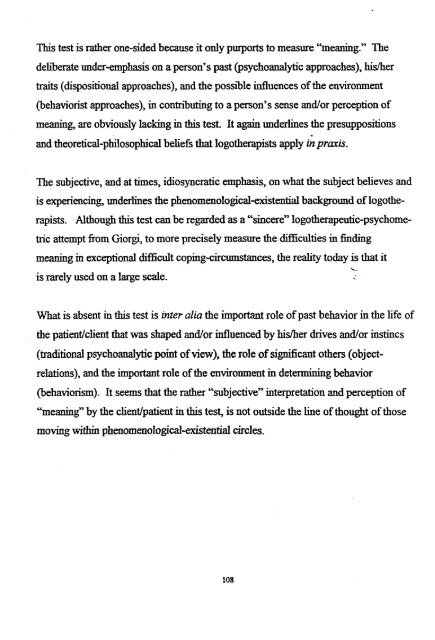View/Open - UZSpace Home
View/Open - UZSpace Home
View/Open - UZSpace Home
You also want an ePaper? Increase the reach of your titles
YUMPU automatically turns print PDFs into web optimized ePapers that Google loves.
This test is rather one-sided because it only purports to measure "meaning." The<br />
deliberate under-emphasis on a person's past (psychoanalytic approaches), hislher<br />
traits (dispositional approaches), and the possibleinfluences ofthe environment<br />
(behaviorist approaches), in contnbutingto a person's sense and/orperception of<br />
meaning, are obviously lackingin this test. Itagainunderlines the presuppositions<br />
and theoretical-philosophical beliefsthatlogotherapists apply in praxis.<br />
The subjective, and at times, idiosyncratic emphasis, on what the subjectbelieves and<br />
is experiencing, underlines the phenomenological-existential backgroundoflogothe<br />
rapists. Although this test can be regardedas a "sincere" logotherapeutic-psychome<br />
tric attempt from Giorgi, to more preciselymeasure the difficulties in finding<br />
meaning in exceptional difficult coping-circumstances, the realitytoday is that it<br />
is rarelyused on a largescale.<br />
Whatis absentin this test is inter alia the important role ofpast behaviorin the life of<br />
the patient/client that was shaped and/or influenced by his/her drives and/or instincs<br />
(traditional psychoanalytic point ofview), the role ofsignificant others (object<br />
relations), and the important role ofthe environment in determining behavior<br />
(behaviorism). It seems that the rather "subjective" interpretation and perception of<br />
"meaning" by the client/patient in this test, is not outside the line ofthoughtofthose<br />
moving within phenomenological-existential circles.<br />
108<br />
"
















